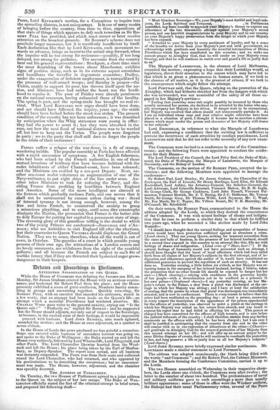France suffers a relapse of the war-fever, in a fit
of strange, wandering babble. The popular assembly at Paris has been affected with a rapid succession of symptoms. A few English fishermen, who bad been seized by the French authorities in one of those mutual invasions of territory that have become habitual with the ruder inhabitants of either Channel-coast, have been released ; and the Ministers are scolded by a sea-port Deputy. Next, an- other sea-coast zealot volunteers an augmentation of one of the Navy-estimates, to put eight ships of the line under arms. An- other takes Ministers to task for reducing the Navy, and dis- abling France from profiting by hostilities between England and America. Some of the more intelligent are alarmed at the fortress which gradually encloses Paris, and one moves that it shall not be surmounted by cannon unless during war : dread of internal tyranny is not strong enough, however, among the free and brave French, to countervail the anxiety to grasp a minacious plaything, and to enjoy, until some dire catastrophe dissipate the illusion, the persuasion that France is the better able to defy Europe for putting her capital in a permanent state of siege. The crowning glory of this grandiose trifling is the denial to which two of the young Princes are condemned—Jotavu.LE and D'Au- MALE ; who are forbidden to visit England till after the elections, lest their courtesies to Queen VICTORIA should displease the Grand Nation. They are to come, therefore, when all the world is out of town, in October. The gayeties of a court in which preside young persons of their own age, the attractions of a London season and its lovely ornaments, are withdrawn from the sight of the youthful gallants ; and all because the French are subject to such fits of warlike lunacy that if they are thwarted their hysterical anger grows dangerous to their keepers.


























 Previous page
Previous page